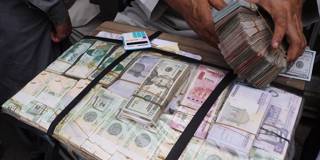Historically, there have long been close parallels between the collapse of monetary systems and the fall of global security orders. Hegemony requires a sound financial basis and global credibility – assets that can evaporate much faster than anyone in power cares to admit.
PRINCETON – This year includes big anniversaries in the history of the international monetary order. August 15 marked 50 years since US President Richard Nixon “closed the gold window”; and on September 21, it will have been 90 years since the British government took the pound off the gold standard. Although both episodes belong to the history of money, their implications transcended the financial domain. Each marked the passing of an entire international security regime.
The nineteenth-century global order had been built around British imperial power, with the gold standard serving as its financial foundation. The gold standard was sustained by the expectation that even if it was suspended in times of war, the end of hostilities would allow the currency to return to its pre-war gold value. That promise of a constant gold value provided an element of credibility that made it easier for a wartime government to borrow, and thus to bear the cost of the conflict.
Because the gold standard had long served as the financial underpinning of Britain’s imperial status, the country returned to it after World War I. But the cost proved to be too high. By 1931, it was evident that a departure from gold was necessary to free up more room for the easy-money policies that would eventually drive the recovery from the Great Depression.

PRINCETON – This year includes big anniversaries in the history of the international monetary order. August 15 marked 50 years since US President Richard Nixon “closed the gold window”; and on September 21, it will have been 90 years since the British government took the pound off the gold standard. Although both episodes belong to the history of money, their implications transcended the financial domain. Each marked the passing of an entire international security regime.
The nineteenth-century global order had been built around British imperial power, with the gold standard serving as its financial foundation. The gold standard was sustained by the expectation that even if it was suspended in times of war, the end of hostilities would allow the currency to return to its pre-war gold value. That promise of a constant gold value provided an element of credibility that made it easier for a wartime government to borrow, and thus to bear the cost of the conflict.
Because the gold standard had long served as the financial underpinning of Britain’s imperial status, the country returned to it after World War I. But the cost proved to be too high. By 1931, it was evident that a departure from gold was necessary to free up more room for the easy-money policies that would eventually drive the recovery from the Great Depression.